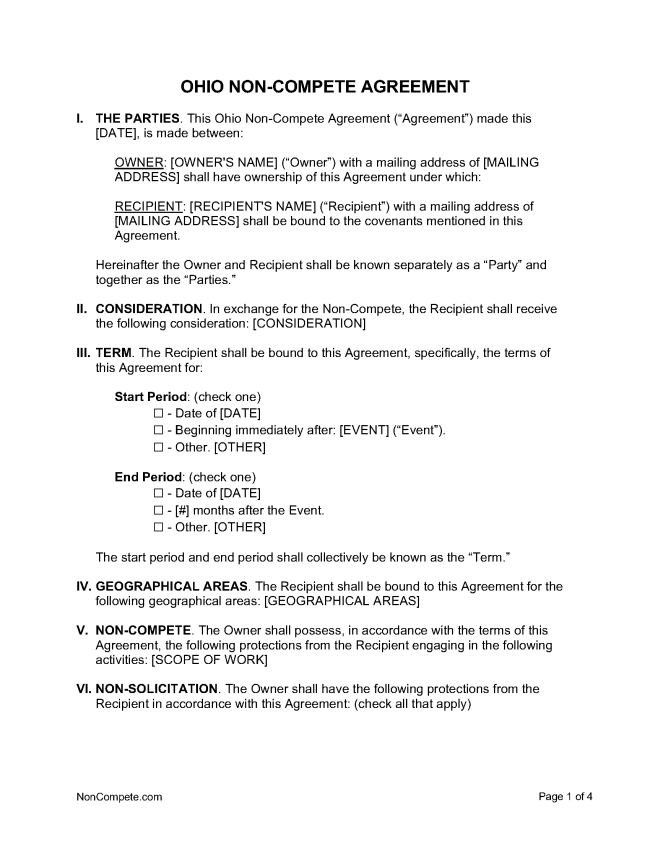An Ohio non-compete agreement is a partial restraint of trade that prevents someone from pursuing work in a particular field. Ohio law on non-compete agreements is relatively generous to employers because it allows non-competes against independent contractors and allows agreements to prevent former employees from taking advantage of their training. Non-compete agreements in Ohio are also assignable.
Table of Contents |
Are Non-Competes Enforceable in Ohio?
Yes, so long as they are reasonable, meaning that they:
- Are no more significant than necessary for the protection of the employer’s legitimate business interests;
- Do not impose an undue hardship; and
- Do not harm the public interest.
Raimonde v. Van Vlerah (1975).
Legitimate Business Interest
Preventing former employees from doing any of the following is a legitimate business interest:
- Taking advantage of personal relationships developed while working for the employer;
- Using the employer’s customer lists to find new customers;
- Using skills, experience, training, or confidential information acquired while working for the employer to gain new customers, regardless of whether the employer had previously worked with the customer.
UZ Engineered Products Co. v. Midwest Motor Supply Co., Inc. (2001).
Protection of trade secrets is a legitimate business interest. (Procter & Gamble Co. v. Stoneham (2000)).
The good will in the sale of a business is a legitimate protectable interest. (Nichols Stores, Inc. v. Lipschutz (1963)).
Independent Contractors
Non-compete agreements are enforceable against independent contractors. (Key Realty, Ltd. v. Hall (2021)).
Assignability
In Ohio, non-compete agreements are “assignable” so long as the contract in which they are contained has an assignability clause. “Assignable” means that if a worker signs a non-compete agreement with Company A, and then Company B buys company A, the worker now is under a non-compete agreement with Company B. (Blakeman’s Valley Office Equip., Inc. v. Bierdeman (2003)).
Prohibited Professions
Attorneys cannot be a party to agreements that limit their right to practice in the future, including:
- Employment contracts, partnership agreements, or similar legal instruments (Rule 5.6(a), Ohio Rules of Professional Conduct);
- Settlements of cases (Rule 5.6(b), Ohio Rules of Professional Conduct).
However, contracts for the sale of a law practice may reasonably restrict a lawyer’s ability to practice for a specific period of time or in a particular area. (Rule 1.17(d)(3)).
Terminating an Employee
A non-compete agreement may be enforceable even against an employee terminated without cause if the non-compete provision in the employee’s employment contract specifically notes that it will remain enforceable in those circumstances. (Homan, Inc. v. A1 AG Servs., L.L.C. (2008)).
Burden of Proof
The employer has the burden of proving that a non-compete agreement meets the elements of enforceability and must prove them by clear and convincing evidence, a higher standard. (Brentlinger Enterprises v. Curran (2001)).
Continued Employment (consideration)
If an offers to continue an at-will employment agreement, that is sufficient consideration to enforce a non-compete agreement against the employee. (Lake Land Emp. Group of Akron, LLC v. Columber (2004)). In the Lake Land case, the Ohio Supreme Court upheld a non-compete agreement when the employee continued working for the company for ten (10) years after signing the agreement.
Maximum Term
There is no maximum term for non-compete agreements because courts evaluate each agreement in context, and the length of time an agreement may last is connected to other factors, such as the nature of the work. In Procter & Gamble Co. v. Stoneham (2000), for example, the Court of Appeals of Ohio upheld a three-year non-compete agreement because the covered employee had had access to confidential information with a “useful life” of three to five years.
In other contexts, where the usefulness of information may not be so easily dated, such as customer contacts, the Ohio Supreme Court has found one-year restrictions reasonable. (Hamilton Ins. Serv., Inc. v. Nationwide Ins. Cos (1999)).
And in non-competes ancillary to the sale of a business, agreements lasting ten (10) years have been upheld. (Nichols Stores, Inc. v. Lipschutz (1963)).
Blue Penciling (allowed)
Courts have the power to modify unreasonable non-compete agreements, and agreements containing unreasonable provisions will be enforced to the extent necessary to achieve the intended purpose of the agreement. (Raimonde v. Van Vlerah (1975)).
